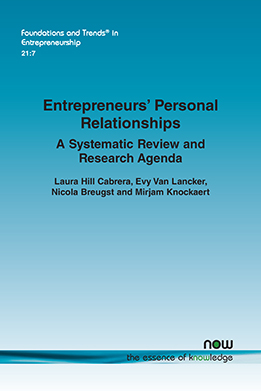Entrepreneurs’ Personal Relationships: A Systematic Review and Research Agenda
By Laura Hill Cabrera, Ghent University, Belgium, laura.hillcabrera@ugent.be | Evy Van Lancker, Ghent University, Belgium, evy.vanlancker@ugent.be | Nicola Breugst, Technical University Munich, Germany, nicola.breugst@tum.de | Mirjam Knockaert, Ghent University, Belgium and Technical University Munich, Germany, mirjam.knockaert@ugent.be
Abstract
Entrepreneurship research and practice acknowledges that entrepreneurship is not an individual endeavor, but a collective effort of multiple stakeholders surrounding and supporting entrepreneurs. Entrepreneurs’ personal relationships are essential to firm development. This review aims to map the existing academic literature on entrepreneurs and their personal relationships. Our systematic literature review indicates that the literature has started to provide answers to the following questions: (i) Which personal relationships do entrepreneurs have and what is their purpose? (ii) How are these relationships formed and how do they evolve? (iii) How do these relationships shape the entrepreneur and their venture? We discuss important research gaps, alongside an agenda with recommendations for future research.
Entrepreneurs’ Personal Relationships: A Systematic Review and Research Agenda
The importance of personal relationships has long been acknowledged within the entrepreneurship literature. It is well known that entrepreneurs rarely act alone. Most new ventures are started by teams and rely on a wide array of external and internal stakeholders in their journey of founding and developing a successful firm. Building and nurturing personal relationships with important stakeholders is a core activity that entrepreneurs need to engage in throughout their entrepreneurial journey. Indeed, personal relationships play a crucial role throughout the entrepreneurial lifecycle, from the pre-startup phase in which stakeholders can assist with idea development, to later stages in the advancement and continuation of the firm. Previous research illustrates the importance of personal relationships for entrepreneurs and how these relationships allow entrepreneurs to achieve important outcomes, such as recognizing opportunities, accessing resources, and receiving advice.
Entrepreneurs’ Personal Relationships provides important contributions to the entrepreneurship literature by synthesizing research on entrepreneurs’ personal relationships, departing from a more traditional social network perspective and uncovering systematic insights from this literature that otherwise might have been missed. The authors adopt a dyadic perspective, which focuses on personal relationships between two individuals, as opposed to a network perspective that examines the broader web of connections. Specifically, the authors examine dyadic relationships between entrepreneurs and key stakeholders, such as investors, suppliers, and co-founders, to understand how interactions with specific actors influence entrepreneurial processes and outcomes. Moreover, the authors present an agenda for future research to encourage scholars to further explore this highly important topic in entrepreneurship. This monograph introduces the complexities of the entrepreneurship context and describes the methods used to define and analyze the sample of research articles from which a framework is formed delineating the dyadic personal relations of an entrepreneur.
